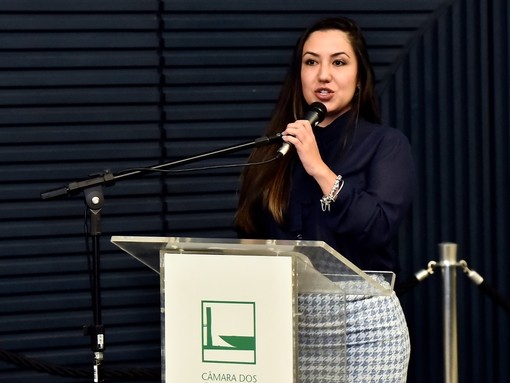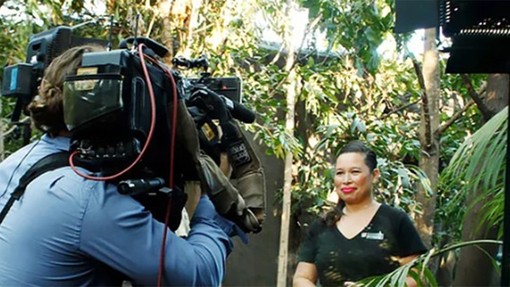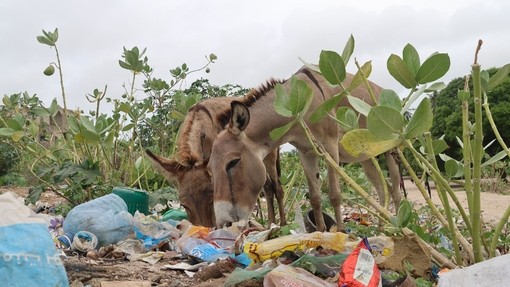
Patricia Tatemoto
Patricia Tatemoto leads on The Donkey Sanctuary’s Skin Campaign in Brazil. Originally a biology researcher, Patricia now applies her scientific knowledge to engage politicians and decision-makers in banning the donkey skin trade in Brazil.
What does this work involve?
I am working to ban the donkey skin trade in Brazil and expand this ban in the entire region, as donkeys are being slaughtered for their skins across South and Central America. We believe Brazil should be in solidarity with the African Union’s decision to ban the donkey skin trade.
I started my role in 2018 with a data assessment about the donkey skin trade in Brazil, but now we work more with the engagement of decision-makers. In Brazil, we have a National Congress made up of the Senate and House of Representatives. My job is to engage them, and other stakeholders, so we can pass the bill that bans donkey slaughter in Brazil.
I also have meetings with departments from the Ministry of Agriculture, the Ministry of Environment, the Ministry of Health, the President of the Federal Council of Veterinary Medicine, the Regional Council members, several universities and activists. I have also met with President Lula and his wife during the campaign, so change really does demand engagement at all levels.

Why should Brazil end the donkey skin trade?
The trade disregards the fundamental principles of animal welfare. Donkeys are often transported over long distances without access to food, water, rest, or veterinary care, causing immense suffering. This cruel practice is driving donkey populations to the brink of extinction in Brazil.
However, the most compelling arguments tend to be around biosecurity because public health is at risk. Donkeys without traceability and under chronic stress may have Glanders, which is a zoonotic infectious disease that can affect humans as well. There is one study showing that if you have it, you have up to 95% chance of dying without treatment. In comparison, COVID-19 had a 1.8% death rate and we lost more than 700,000 people in Brazil. So the risk here is not insignificant.
Other scientists also identified and published reports of other diseases because the donkeys are immunosuppressed, brought together, and transported while suffering. As is the case for humans, if donkeys are under chronic stress, their immune system is not working properly and they are more likely to share pathogens - especially because the animals have no traceability.
The threat of extinction is urgent. Scientists have shown that the donkey genome in Brazil is unique, and losing it impacts food security. Scientists from around the world have developed the family tree of donkeys, unequivocally demonstrating the importance of preserving the genetic heritage of these species across the globe. We are losing genetic resources. I don’t like to describe donkeys as a resource, as they have value on their own, but for our own survival, we must protect the biodiversity of our planet.

The nature of the donkey skin trade is extractive, which means the process removes raw materials from the earth. We have scientific papers showing that it’s cost-prohibitive, because we don’t have the genetics for fast-growing donkeys. They have to be around four years old before you can send them to the slaughterhouse. It costs a lot of money to raise them.
You’re also looking at a way to reduce demand for donkey skins. What’s involved?
The donkey skin trade is fed by the demand of the Chinese Traditional Medicine market. Biotechnological innovation has found a way through cellular agriculture to produce the same desired product - collagen - using microorganisms such as fungi and bacteria, rather than animals. We can create a biologically identical product, without needing all the natural resources of water or land etc. It is more ethical, safe and sustainable and therefore the Ministry of Environment and Climate Change is funding research on this at the Federal University of Paraná.
We are also encouraging investment from other politicians. It would be amazing to meet the demand for Chinese Traditional Medicine without killing the donkeys. I don’t blame other cultures because we have an extractive history of farming here in Brazil too, in some of the ancestor cultures and forms of subsistence. We need to work together toward a sustainable future for us and for donkeys.
You were a researcher originally, how did you end up here?
From when I was very young, I wanted to be a biologist or a vet.
During my studies as a biologist, I worked at a zoo and became interested in how animals feel. I am an animal welfare scientist, but most are looking at physical health. For me our welfare is in our minds. For example, during my master’s degree, I investigated how exposure to a more complex environment influences emotionality in fish. I’m deeply fascinated by the brain’s adaptability to environmental stimuli and how these changes manifest in behaviour. Then during my PhD, I worked with another tool for assessing animal welfare - epigenetics (the study of how behaviour and the environment can affect how genes function).
It might surprise you to hear that my interview with The Donkey Sanctuary in 2018 was the worst job interview that I have done in my life! They needed someone to be the eyes and ears of the donkey community in Brazil - to understand the donkey skin trade and slaughter. For every question they asked me I replied with, ‘I don’t know’. How many donkeys are being slaughtered? Where are the slaughterhouses? I didn’t know that, nobody knew this information. I told them I’d have to start the research from scratch, and so my position started with data collection and assessment.
I was not a campaigner at all. I left the lab where I was isolated, in silence, to sometimes having nine meetings with different politicians in one day. I have to adjust my arguments for each meeting, and work with a consultant for governmental relations. Before each meeting, he explains to me in one minute the background of the person I’m about to meet - who they are, their position, their politics - and then I know which kind of argument from our portfolio of science-based points I will focus on to capture the attention of that politician in the few minutes we will spend together.

Do you still work with data?
Yes, and I still use science. For example, during a public hearing, a politician’s assistant raised that donkeys cause a negative impact on native ecosystems. I asked to see the research, then went away and looked into it. I found the opposite - that donkeys have several positive ecological roles in the management of native ecosystems. As a scientist, I can show that data can be biased and challenge it with accurate data, strong arguments and storytelling.
I was naive when I was a scientist and not yet a campaigner. I thought that showing evidence would be enough to convince people. We have more than enough scientific data about the donkeys and, this is rare in science, all the scientific data about biosecurity, genetics, their ecological role and public health shows the same conclusion. We must ban donkey slaughter in Brazil. Even with the data, we have not banned the trade in Brazil yet. So we must abandon the idea that showing scientific evidence is enough. It’s about what we are going to do with this data to convince the decision-makers do the right thing.
How do you keep your motivation in this work?
Before I enter every single meeting, I breathe and think, “This is going to be the meeting that changes everything for donkeys”. To our surprise, some parliamentarians are now actively engaged and support that we need to act immediately to stop donkey slaughter nationally. We are basing our conversation on numbers, evidence and science. We help them see that the donkey skin trade is unsustainable.
Have you always been interested in donkeys?
The donkeys here in Brazil are from the Northeast and I am from the South. But my mother has travelled in the Northeast with my father and she talked about the donkeys to me. She said, “If you see a baby donkey you will be in love.”
In 2019, when I participated in the first donkey farm seizure, I was talking with a baby donkey. My work was always about animals, but after that moment it became a really personal thing with the donkeys. I told that baby that I was going to ban the donkey skin trade here in Brazil. I have a photo of that moment.

This specific farm in 2019 was a very hard moment. As a postdoctoral fellow, in partnership with The Donkey Sanctuary and the University of São Paulo, I was called upon by the Public Ministry of the city to provide expertise on how to address a case of 800 donkeys suffering from starvation on a farm. They needed a specialist opinion on animal welfare and abuse, as well as guidance on managing such a large number of neglected animals.
Over the weekend, I travelled 2,000 kilometres, including more than six hours by bus, and took up residence in a gas station hotel. I called animal scientists and asked the best way to start feeding the starving donkeys again, so I didn’t make them sick. I was at that farm for four months.
They had people in slavery conditions - without food, toilets or a kitchen - and then all of the starving donkeys. Together with the prosecutor, we convened a hearing that brought together key stakeholders. I also contacted the President of Fórum Animal, a coalition of 130 NGOs, and we secured guardianship of the donkeys.
Today, the surviving animals are housed on a farm where we are establishing an Institute for the Conservation of Donkeys, dedicated to their welfare and long-term protection. Some of these rescued donkeys have since given birth – and one of the babies was even named Patricia!
I made such a strong connection with donkeys then, that I will never be the same. My connection with donkeys is forever.
How do you keep your empathy for people?
I can’t see people as the enemy. I think that sometimes people are victims as well, it’s an entire system. We try to support each other in the movement and have workshops with scientists, NGOs and universities to talk about a sustainable future for donkeys.
But if we are talking with a politician who is supporting donkey slaughter, I just see it as they haven’t understood yet. But they will.
What are you most proud of in your work so far?
Elevating the status of donkeys in Brazil. This is reflected in the speeches of parliamentarians. Last year we took a bill to the Commission of Environment inside the National Congress. The bill was to ban donkey and equine slaughter in Brazil. Five politicians spoke about the importance of protecting donkeys - and this in the context of us knowing that horses are more appealing to people. I was so proud.
We also brought donkeys to the National Congress in other ways, with an exhibition in the Congress Building for art and artists from the Northeast. We were elevating the plight of donkeys, but also shining a light on the culture of these artists.
In 2022, we even turned the National Congress orange – to represent the perpetual sunshine and breathtaking sunsets in Brazil’s Northeast, where donkeys are predominantly found.
Imagine a National Congress of a country like Brazil lit up entirely orange, standing against donkey slaughter!

Find out more about our campaign to end the donkey skin trade in Brazil
Read moreShare this page
Tags
- Blog




